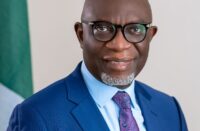 The Deputy Governor, Corporate Services, Central Bank of Nigeria, Mr. Suleiman Barau, on Tuesday stated that the macro-economic indices of the economy showed that the country was on the right course to attaining significant growth and development.
The Deputy Governor, Corporate Services, Central Bank of Nigeria, Mr. Suleiman Barau, on Tuesday stated that the macro-economic indices of the economy showed that the country was on the right course to attaining significant growth and development.
He, however, said that a lot of improvement still needed to be done in the area of leadership.
Barau spoke at the Hallmark Public Policy Forum in Lagos, which had the theme, ‘Saving the Future: Challenges of the New Nigeria.’
He said, “We can improve on our leadership. It is an area of challenge that we need to improve on. We need to elect credible leaders. We have credible leaders but we need to hold them accountable.
“If we have a leader that is disciplined, sets agenda and implements it and we hold him accountable and with our potentials, we would be on top as one of the greatest countries in the world, at least in Africa.”
The Group Managing Director/Chief Executive Officer of Diamond Bank Plc, Dr. Alex Otti, also at the event, said there was a need for the country to re-harness its industrial policies and plan in order to resuscitate the ailing industries, noting that competitiveness in the global market had once again been brought to the fore.
Otti, who was the guest speaker at the forum, said the nation’s economic growth might amount to nothing if it was not accompanied by a corresponding level of development.
He said, “Nations compete to offer the most productive environment for business. Competitiveness depends on productivity, with which a nation uses its human, capital and natural resources.”
Otti noted that the country was ranked 147 out of 189 countries surveyed in ease of doing business, even as it recorded low rating in the areas of electricity provisions, property registration, trading across borders, enforcing contracts and payment of taxes.
“It is difficult to do business here – simple fact. The product and services that come out of this system will struggle to compete on quality, or if it is right quality, will struggle to compete on price. “These are just some of the areas we need to pay closer attention to in order to build a competitive and more attractive country in future.”
Otti said despite the conspicuous absence of many public services and infrastructure, there had been cheery news about the country’s Gross Domestic Product, which has witnessed commendable growth quarter on quarter, with 2013 third quarter growth rate of 6.81 per cent, according to figures released by the National Bureau of Statistics.
However, Otti said the growth in GDP “does not tell the story of our national development as it has not really translated to better life for citizens.”
He called for massive investment in critical sectors of the economy to guarantee an all-inclusive growth. Such sectors include education, medicare, infrastructure, entrepreneurship, enterprise and innovation.
For the National Bureau of Statistics, its projection are that the Nigerian economy would grow in 2014 at 7.44 per cent for the first quarter; 7.34 per cent for second quarter; and 7.24 per cent for the third quarter; and 7.15 per cent for fourth quarter.
Source: Punch (by Oyetunji Abioye)






